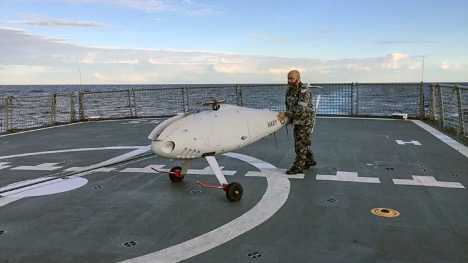Australia Pursues Maritime Unmanned Systems
The Commonwealth has issued an Invitation to Register (ITR) to industry for the Project SEA 129 Phase 5 Block 1Maritime Unmanned Aircraft Systems (MUAS) Continuous Development Program requirement for the RAN.
The ITR was issued on August 6, a day after Defence Minister Senator Linda Reynolds issued a statement announcing an “up to $1.3 billion in a new Unmanned Aircraft Systems (UAS) development program to enhance situational awareness across Australia’s vast maritime environment”. Curiously, the minister’s statement that didn’t actually mention the project’s name or designation.
The ITR covers Block 1 of the project which will see seven maritime UAS ‘capability bricks’ acquired, and will focus on “workforce growth, training system development, Combat Management System (CMS) integration, and payload development”. Block 1 systems will be operated primarily from the forthcoming Arafura class offshore patrol vessels (OPV) as well as Navy’s ANZAC class frigates (FFH), and service entry is scheduled for 2024.
The ITR says Defence’s intent is for Block 1 to be a “whole-of-systems solution provided by a single supplier”, although it will consider two suppliers to separate OPV operations from the ANZAC class if necessary.
“Whilst Defence’s strong preference is for a ‘one-size-fits-all’ solution, the differences between the OPV and MFU (major force unit) facilities, available aviation spaces, effects and operating conditions may result in the capability being delivered by two different solutions,” the ITR reads.
Although not covered in the ITR, it did lay out the program’s follow-on phases. Block 2 is scheduled to enter service in 2029 and will see a refresh of the OPV’s MUAS capability, and acquire an additional five capability bricks for other major surface assets such as the Hunter class frigates. At that time, it is anticipated that Defence will also engage a commercial capability partner “to build a mature mission and support system”.
Block 3 is scheduled to enter service from 2034 and will comprise a comprehensive update and refresh of the UAS capability’s 12 capability bricks, training, and support systems.
“Now, more than ever, Defence requires an agile acquisition strategy to take advantage of state-of-the-art technology,” the minister’s statement reads. “This acquisition heralds a new intelligence, surveillance, reconnaissance and targeting capability for Defence to ensure Australia keeps pace in this rapidly developing technology domain.
“Developing sovereign industrial capability through projects like this is critical to enhancing Australia’s industrial base and maritime security,” it adds. “This program will provide opportunities for Australian industry to innovate, develop and grow. An (ITR) will be released for industry to investigate the capability and capacity of Australian industry to deliver all elements of the Maritime UAS, including air vehicles, sensor payloads, integration, training, and sustainment.”
The Block 1 ITR is scheduled to close at 1200 on September 25, and a shortlist of contenders will be announced on December 17. An industry brief is scheduled to be conducted at 1100 on August 21.
This article was published by ADBR on August 6, 2020.

